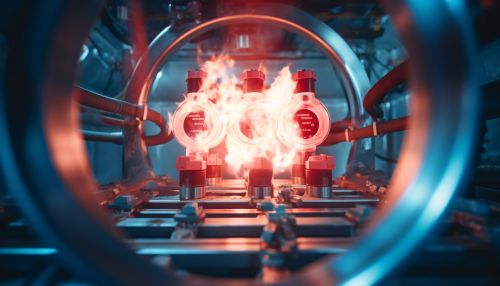Internal Energy
Overview
Internal energy is a fundamental concept in thermodynamics, the branch of physical science that deals with the relationships between heat and other forms of energy. It is the total energy stored in the molecules of a system, and can be thought of as the sum of all the kinetic and potential energies of all the particles in the system. It is a state function, meaning its value depends only on the current state of the system, not on how that state was achieved.
Definition
In thermodynamics, the internal energy (often denoted by the symbol U) of a system is defined as the total energy contained within the system. It is the energy necessary to create the system in the absence of changes in temperature or volume. But if the process changes the volume, such as in a chemical reaction which leads to a change in the number of moles of gas, then work must be done. If the process is done at constant volume, so that no work is done, then the internal energy is just the heat transferred.


Measurement
The internal energy of a system can be measured indirectly through other quantities. For instance, it can be calculated from measurements of the system's temperature, volume, and pressure using the ideal gas law. It can also be calculated using the specific heat and the change in temperature, if the process is done at constant volume. However, it is important to note that the internal energy is not directly measurable because it includes the kinetic energy of the particles, which is not directly observable.
Changes in Internal Energy
The internal energy of a system can change as a result of energy transfer in the form of heat or work. According to the first law of thermodynamics, the change in internal energy of a system is equal to the heat added to the system minus the work done by the system. If the system does work on its surroundings, the internal energy decreases and if work is done on the system, its internal energy increases. Similarly, if heat is added to the system, its internal energy increases and if heat is removed, it decreases.
Role in Thermodynamics
The concept of internal energy plays a central role in the first and second laws of thermodynamics. According to the first law, the change in internal energy of a system is equal to the heat added to the system minus the work done by the system. The second law of thermodynamics, on the other hand, places restrictions on the types of processes that can occur, specifically it states that processes that increase the total entropy of the universe are favorable.
